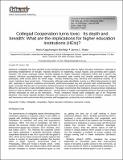Collegial cooperation turns toxic: Its depth and breadth: What are the implications for higher education institutions (HEIs)?

View/
Date
2021-02Author
Kaguhangire-Barifaijo, Maria
Nkata L., James
Metadata
Show full item recordAbstract
Collegiality has been glorified as the strongest governance pillar for higher education institutions, especially in
promoting independence of thought, impartial decisions on leadership, mutual respect, and providing peer support.
However, the recent corporate culture recently adopted by Higher Education Institutions (HEIs) and a system that
rewards individual accomplishments, together with decreased state funding had steadily weakened the collegial
philosophy, while toxicity takes the center stage - thereby threatening unity, harmony and institutional visibility. As a
result, institutions have turned toxic. Unfortunately, although easily identifiable, toxicity is a difficult phenomenon to deal
with, especially in dynamic academia environment, performance-based pay and personal traits notwithstanding. The
paper concludes that the lack of conclusive empirical research to establish the depth and breadth of toxicity has made it
difficult for personnel to make defensible decisions. The paper recommends that institutions should prioritize institutional
inquiry in order to address work related behavior – among others to negate unacceptable behavior that have persistently
harmed individuals as well as the institutions. Finally, institutions should make collegiality part of all “Personnel
decisions” that clearly stipulate flawless indicators and measures of toxic behavior, in order to enhance collegial, civil
and harmonious work environment that promotes staff engagement, productivity and institutional stability.
